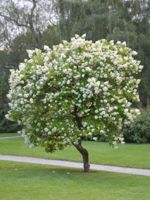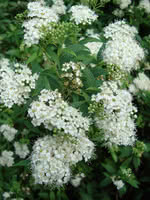Mon-Fri 9am - 5pm Mountain time
Japanese Tree Lilac vs White Meadowsweet
Syringa reticulata
Spiraea alba
NOT AVAILABLE THIS SEASON - MIGHT RETURN
NOT AVAILABLE THIS SEASON - MIGHT RETURN
Japanese Tree Lilac is an attractive, heavy-flowering lilac with fragrant white blossoms. It can be pruned to a single stem or grown as a multi-stemmed shrub.
Japanese Tree Lilac's dark reddish-brown bark peels as the tree ages, creating visual appeal for any yard, especially in the winter.
This tree is often planted along boulevards and its attractive white flowers signal spring to all who drive by.
White Meadowsweet is a woody, deciduous shrub that begins to bloom in early summer with small white and pink flowers. Its foliage turns from a light green into an attractive golden-yellow later in the fall.
The White Meadowsweet, also known as Mead-Wort or Bride-Wort, is favored by birds and butterflies but is largely ignored by deer. They produce small brown berries in the summer, and while they are technically edible, they are not sweet and are more desired by wildlife.
Japanese Tree Lilac Quick Facts
White Meadowsweet Quick Facts
In row spacing: 0.9 m (3 ft)

